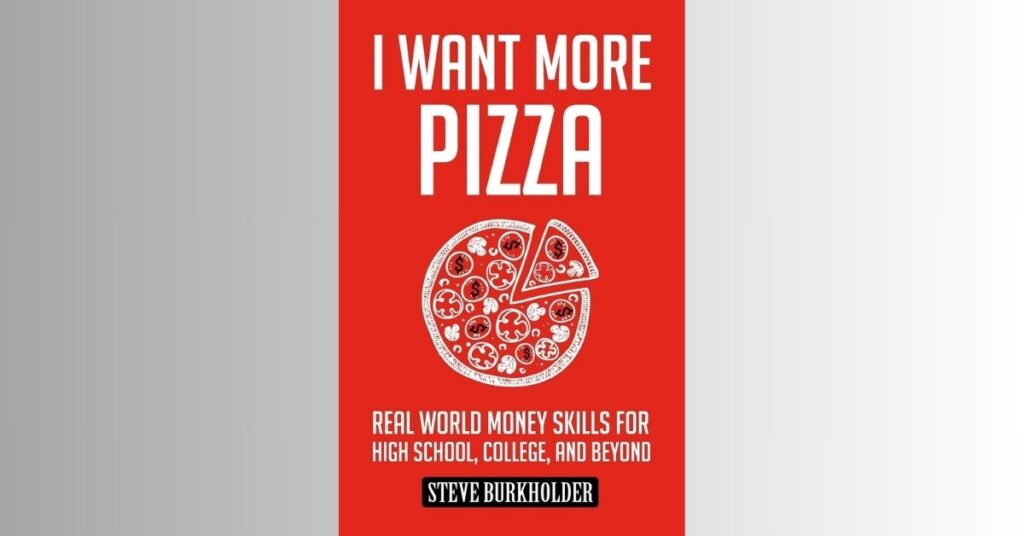Learning how to save money and the important “why” we should do it is a cornerstone to healthy personal finances. It leads to financial security and future wealth. Teaching your autistic teen to save money is setting them up for future financial success. Of course, to save money, your autistic teen also need to learn how to develop a spending plan, or a budget. Making the most of each dollar they bring home will help them reach their financial goals and secure their future.
As a reminder, we are using the book “I Want More Pizza: Real World Money Skills For High School, College, And Beyond” (affiliate link) by Steve Burkholder for these lessons. Steve is a certified public accountant and has worked in the finance department in higher education. He has a passion for teaching teens and young adults about personal finance, and I found his book a few years ago when looking for a good resource for J, my son with autism and ADHD, to learn about money.

Check out the first three lessons of this series:
Kids Money Skills, Lesson 1: Why autistic teens should learn about personal finance
Kids Money Skills, Lesson 2: Encourage a positive money mindset in your autistic teen
Lesson #4: Basic budgeting and the importance of savings
Read the “2nd Slice” (pages 27-37) of “I Want More Pizza” (affiliate link) with your teenager. This section is quite long, so I found out it is best to let your teen read it on their own before the lesson.
Saving and budget takeaways to share with your autistic teen
- The opening quote from Warren Buffet really sums it up: “Do not save what is left after spending, but spend what is left after saving. If you buy things you do not need, soon you will have to sell the things you need.”
- It is important to understand the reasons to save money. Sometimes, people save money in one area to buy something nicer in another area. Saving money for unexpected expenses is always smart. In addition, saving to grow your money over time is what leads to secure finances and the ability to build wealth in retirement accounts, save for college, put a down payment on a house or be able to take your dream vacation one day.
- Everyone can save money, no matter how much they make. It may be just $1 to start, but every little bit grows over time. When teenagers first begin working, they don’t make much money. However, it’s important to put a little money away in a savings account from each paycheck to put toward savings goals.
- One easy way to save is to do it automatically, or what Steve refers to as an “auto-saver.” Your teen will need two bank accounts – a savings account and checking account. Once they are earning a consistent income from jobs (e.g., part-time job, lawn mowing, babysitting, etc.), then they can set up an automatic transfer from their checking to their savings account once a month. This allows them to save automatically instead of making the manual transfer every month.
- It’s important to know how we spend each dollar, so tracking expenses is really important. Your teen can write down the money they’ve spent in a small notebook or use a budgeting app like You Need a Budget (referral link), which is my favorite and what my boys will use once they have a regular part-time job.
- Once your teen has been tracking expenses for a month or so, they will see that small purchases really add up and make better decisions on how they want to spend their money. They can then make their first budget!
Discussion tips with your teen
- Discuss why it is so important to have savings and how you would worry about paying for unexpected expenses or being able to afford something if you didn’t have any savings.
- Talk about checking and savings accounts and their unique functions. Then discuss how your teen can set up an auto-saver for their money. That could be done either now or in the future when they have a regular part-time job and income). How much money could they start saving each month? Even $5 or $10 will add up over time.
- How does your teen spend their money? Discuss how small purchases really add up and whether they are moving them toward or away from their savings goals.
- Plan a time for Lesson 5.
Practical Money Activity
Find a small notebook (or purchase one if necessary) and have your teen write down their expenses for a month. They will have a better understand of how they are spending their money. Then your autistic teen can develop their first budget based on their learning.








